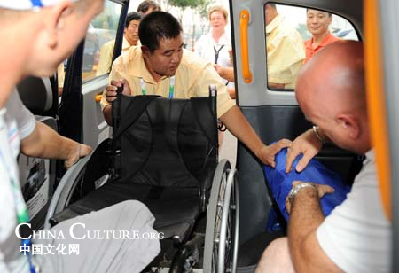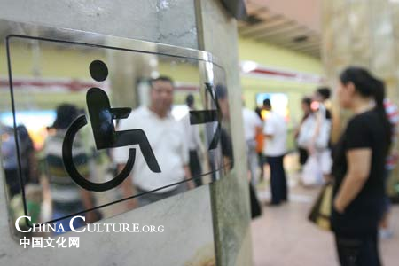
A volunteer helps move the wheelchair of French athlete Nicolas Peifer into a barrier-free taxi in front of the Main Press Center in Beijing Sept. 4, 2008. Many barrier-free facilities were installed in buses, taxis and subway stations, making it more convenient for disable people to get on and off.
Chinese awareness of the welfare of its 83 million disabled population is rising as its capital prepares to host the Paralympics, which starts in two days.
During its seven years of preparation for the Olympics and Paralympics, Beijing took account of the needs of disabled people when updating public facilities.
Each of the city's 123 subway stations now has at least one entrance equipped with a wheelchair lift, according to the subwaycompany.
Beijingers are seeing more public buses with lowered doors, toilets with assistive devices and warning systems on the streets.
Parks, tourist sites, including some heritage sites like the Forbidden City, and museums have modified their facilities to be accessible for the disabled. All Chinese airports have adopted accessible designs.
Banks and post offices in some cities also provide service in sign language.

Photo taken on Aug. 27, 2008 shows the barrier-free sign at a subway station in Beijing, capital of China. Numbers of barrier-free signs have appeared recently at Beijing subway stations as the Beijing Paralympic Games approaches.
"We plan to help all households with disabled members in Beijing modify their residences before the end of 2010," said DingXiangyang, the city's vice mayor. So far, the city has extending funding for about 5,000 such households to install assistive facilities.